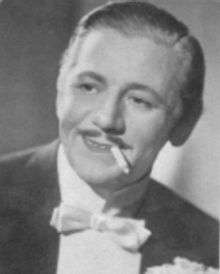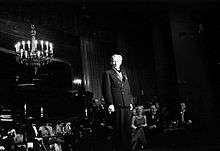Paul Hörbiger
| Paul Hörbiger | |
|---|---|
 Publicity photo, 1939 | |
| Born |
29 April 1894 Budapest, Austria-Hungary |
| Died |
5 March 1981 (aged 86) Vienna, Austria |
| Occupation | Actor |
| Years active | 1928–1974 |
| Spouse(s) | Josefa Gettke (1921-1939) (divorced) 4 children |
Paul Hörbiger (29 April 1894 – 5 March 1981) was an Austrian theatre and film actor.[1]
Life and work
Paul Hörbiger was born in the Hungarian capital Budapest, then part of Austria-Hungary, the son of engineer Hanns Hörbiger, founder of the Welteislehre cosmological concept, and elder brother of actor Attila Hörbiger. In 1902 the family returned to Vienna, while Paul attended the gymnasium (grammar or high school) at St. Paul's Abbey in Carinthia. Having obtained his Matura degree, he served in a mountain artillery regiment of the Austro-Hungarian Army in World War I, discharged in 1918 with the rank of an Oberleutnant.
After the war, Paul Hörbiger took drama lessons and began his acting career in 1919 at the city theatre of Reichenberg (Liberec). From 1920 he performed at the New German Theatre in Prague. His fame grew when in 1926 he was employed by director Max Reinhardt at the ensemble of the Deutsches Theater in Berlin, reaching a high point with his appointment at the Vienna Burgtheater in 1940. He also appeared at the 1943 Salzburg Festival, performing in the role as Papageno in Mozart's opera The Magic Flute.

From 1928 he appeared in more than 250 films, mostly lightweight comedies of the Wiener Film genre popular among German and Austrian audiences during the 1930s and 40s. In 1936 he established his own filming company Algefa jointly with director E. W. Emo. In 1938 he, like many other celebrities, openly acclaimed the Austrian Anschluss to Nazi Germany and smoothly continued his career, also appearing in propaganda films like Wunschkonzert or Die grosse Liebe which earned him an entry on Goebbels' Gottbegnadeten list. On the other hand, Hörbiger inconspicuously met with opposition circles around Theo Lingen and Oskar Sima and in the late days of World War II he was even arrested for treason by the Nazi authorities.
After the war he quickly resumed his career, playing the murdered porter in Carol Reed's British film classic The Third Man (1949). From 1947–49 he was also chairman of the First Vienna FC football club.
Paul Hörbiger remained one of the most popular German-speaking film actors of the 1950s and 1960s, starring in numerous Heimatfilm and Wiener Film productions. He again performed as the warm-hearted Viennese type and Heurigen singer, often together with Hans Moser and director Franz Antel. In his later years he again concentrated on theatre acting at the Burgtheater, where he last premiered in 1979 with Elias Canetti's Komödie der Eitelkeit.
Personal life
In 1921 he married the actress Josepha Gettke with whom he had four children. Hörbiger died in Vienna aged 86 and is buried in an Ehrengrab at the Vienna Zentralfriedhof. The actress Christiane Hörbiger, daughter from his brother Attila's marriage with Paula Wessely, is his niece. The actors Christian Tramitz and Mavie Hörbiger are grandchildren of Paul Hörbiger.
Selected filmography
- Strauss Is Playing Today (1928)
- The Gallant Hussar (1928)
- The Weekend Bride (1928)
- Song (1928)
- Tales from the Vienna Woods (1928)
- Dyckerpotts' Heirs (1928)
- The Lady with the Mask (1928)
- The Great Adventuress (1928)
- The Green Monocle (1929)
- The Woman Everyone Loves Is You (1929)
- Women on the Edge (1929)
- The Convict from Istanbul (1929)
- Spione (1928, directed by Fritz Lang)
- Her Grace Commands (1930)
- Never Trust a Woman (1930)
- The Immortal Vagabond (1930)
- Three Days Confined to Barracks (1930)
- The Squeaker (1931)
- Der Kongreß tanzt (1931)
- The Merry Wives of Vienna (1931)
- Grock (1931)
- The Unfaithful Eckehart (1931)
- Peace of Mind (1931)
- Poor as a Church Mouse (1931)
- Once There Was a Waltz (1932)
- Trenck (1932)
- Frederica (1932)
- A Mad Idea (1932)
- Peter Voss, Thief of Millions (1932)
- Paprika (1932)
- The Secret of Johann Orth (1932)
- You Don't Forget Such a Girl (1932)
- Quick (1932)
- A Tremendously Rich Man (1932)
- A Blonde Dream (1932)
- Scampolo (1932)
- Homecoming to Happiness (1933)
- Two Good Comrades (1933)
- Greetings and Kisses, Veronika (1933)
- Scandal in Budapest (1933)
- The Emperor's Waltz (1933)
- A Song for You (1933)
- The Big Bluff (1933)
- Liebelei (1933), directed by Max Ophüls
- Waltz War (1933)
- Spring Parade (1934)
- The Csardas Princess (1934)
- The Gentleman Without a Residence (1934)
- My Heart Calls You (1934)
- Last Stop (1935)
- If It Were Not for Music (1935)
- A Hoax (1936)
- His Daughter is Called Peter (1936)
- Florentine (1937)
- Cause for Divorce (1937)
- Heimat (1938)
- The Blue Fox (1938)
- Opernball (1939)
- Immortal Waltz (1939)
- A Mother's Love (1939)
- Maria Ilona (1939)
- Falstaff in Vienna (1940)
- Beloved Augustin (1940)
- Vienna Tales (1940)
- Operetta (1940)
- Wunschkonzert (1940), as himself
- Die grosse Liebe (1942)
- Whom the Gods Love (1942)
- Der Engel mit der Posaune (1948)
- The Third Man (1949) as Karl - Harry's Porter
- Veronika the Maid (1951)
- The Forester's Daughter (1931)
- When the Evening Bells Ring (1951)
- The Land of Smiles (1952)
- I Lost My Heart in Heidelberg (1952)
- 1. April 2000 (1952)
- Voices of Spring (1952)
- My Name is Niki (1952)
- You Only Live Once (1952)
- Mikosch Comes In (1952)
- Life Begins at Seventeen (1953)
- The Dancing Heart (1953)
- Young Heart Full of Love (1953)
- We'll Talk About Love Later (1953)
- The Rose of Stamboul (1953)
- The Private Secretary (1953)
- My Sister and I (1954)
- Raub der Sabinerinnen (1954)
- Victoria in Dover (1954)
- The Gypsy Baron (1954)
- My Leopold (1955)
- Charley's Aunt (1956)
- Der schönste Tag meines Lebens (1957)
- The Winemaker of Langenlois (1957)
- Lemke's Widow (1957)
- Sebastian Kneipp (1958)
- I Learned It from Father (1964)
- Der Alpenkönig und der Menschenfeind (1965) as Astragalus
- Call of the Forest (1965) as Gustl Wegrainer
- Das ist mein Wien (1965)
- Was geschah auf Schloß Wildberg (1972) as Xaver Doppler
Awards
- State actor (Staatsschauspieler) (1942)
- Decoration of Honour in Gold for Services to the Republic of Austria (1964)
- Medal of the Austrian capital Vienna (1964)
- Kammerschauspieler (1969)
- Film Award for many years of excellent work in the German film industry (1969)
- Girardi Ring (1972)
- Austrian Cross of Honour for Science and Art, 1st class (1974)
- Honorary Ring of Vienna (1977)
- Nestroy Ring (1980)
References
External links
- Paul Hörbiger on IMDb
- Paul Hörbiger at Virtual History